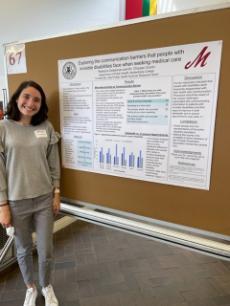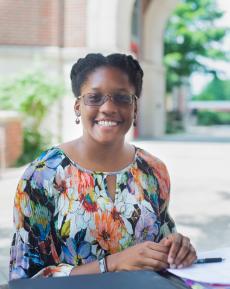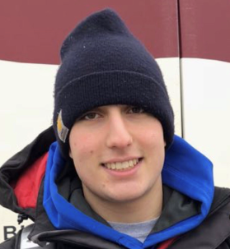Our public health students dive into a variety of research topics that focus on issues with real impacts on communities—ranging from understanding radon risk and awareness to an exploration of the communication barriers faced by people with invisible disabilites.
Learn more about the research our students are embarking on within the Public Health Program.
 Rebecca Zickerman '24
Rebecca Zickerman '24
Prehealth public health major
I researched the communication barriers that people with invisible disabilities face when seeking medical care and communicating with a healthcare provider. My interest in this project stems from my own personal experiences of having an invisible disability and doing work in this area in the past.
I began volunteering with the Invisible Disabilities Association my sophomore year of high school and helped pass legislation in Colorado that would place a symbol on an individual's ID to indicate if they have an invisible disability. I was able to share my story and advocate for members of the disability community on multiple platforms. However, I wanted to do more than this. I am hoping to become a physician and am really interested in how people with disabilities are treated in the medical field. Working with Dr. Cronin has been the most rewarding experience and I have learned so much from her. She walked me through each step of the research process, and it is so cool to be able to look back now and see everything that I have accomplished since I started working with her last January.
 Rashida Haye '20
Rashida Haye '20
Public health major, sustainability studies minor
Throughout Summer 2018, I continued working alongside Dr. Chrysan Cronin with her research on radon risk, awareness, and effective health communication. This past semester, we conducted focus groups among Allentown residents as a way to determine which types of media platforms were most commonly used for news and health information. We showed existing radon public service announcements- created by the Pennsylvania Department of Environmental Protection (PADEP)- and asked the focus group participants if the videos were effective and/or made them want to take action to test their homes for radon. At the conclusion of the discussion, each person was given a free radon test kit to test their home radon levels.
 Benjamin Solomon, ‘20
Benjamin Solomon, ‘20
Public health major
I worked with Dr. Siegel a professor of environmental health at the Boston University School of Public Health. We used the UCR crime file over the 26 year period of 1991 - 2016 to attempt to determine if gun laws had differentiating effects in urban and non-urban areas. We first defined urban areas as cities or counties with a population over 100,000. Then I had to find all those areas using the 1991 population data. I spent most of the summer finding, and in some cases imputing population data, crime data and other and other control data to use for our linear regressions. Eventually we had a full data set with all the information needed to run our linear regressions. After running the regressions we wrote up a paper and sent it to the Journal of Urban Health, to hopefully get published. What was cool about this project is that as far as we could find no previous study had examined differentiating effects of firearm laws in urban vs non-urban areas at the city level.
